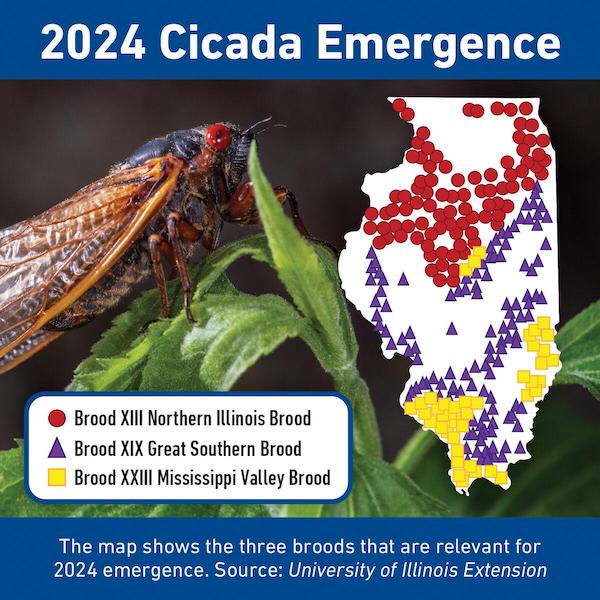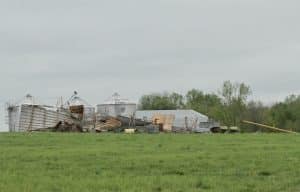Rare cicada emergence this spring

By RHIANNON BRANCH
FarmWeek
Illinois will experience a rare phenomenon of nature this year as two broods of periodical cicadas are scheduled to emerge at the same time.
And this once-in-a-lifetime occurrence won’t happen again until 2245.
Kacie Athey, a specialty crop entomologist at the University of Illinois, said the Northern Illinois Brood that emerges every 17 years and the Great Southern Brood, which emerges every 13 years, will come out simultaneously for the first time since 1803.
Stragglers from the Mississippi Valley Brood might also appear in 2024.
While the two broods will emerge at the same time, there will likely be only a few places in central Illinois, around Springfield, where they will emerge in the same area, according to the University of Illinois Extension.
Illinois residents should expect to see and hear them from late May to mid-June.
“They start coming out of the ground when the soil temperatures hits 64 degrees Fahrenheit at the depth that they’re actually at, which is 7 to 8 inches deep,” Athey told FarmWeek.
But what impact will these insects have on agriculture?
Illinois State Veterinarian Mark Ernst said they don’t pose a notable threat to livestock, and U of I Field Crop Entomologist Nick Seiter confirmed cicadas won’t harm row crops.
But Athey said tree fruit producers should keep an eye out for them.
“Cicadas do damage by cutting into small branches and laying eggs inside of them,” she said. “So if you are a tree fruit producer here in Illinois and you have young trees, you do need to protect them if cicadas come out in your orchard.”
Athey said the most harm will be to young trees, but mature trees that are planted in high densities are also at a high risk for cicada damage.
“Those trees really resemble young trees more than a traditional mature tree,” she said. “And so those orchards need to be protected.”
Emergence patterns are scattered across the state, but Athey said the periodical cicadas won’t be seen everywhere so preventative measures shouldn’t be implemented until cicadas are confirmed in the area.
She said males will emerge first and emit a loud singing noise, so if producers hear it they know to act before the females emerge to lay eggs.
For large-scale producers, she said there are several insecticides labeled for cicada control, but small-scale fruit tree growers and homeowners with young trees should start by wrapping the trees.
“You can wrap your tree in mesh that is one-fourth of an inch or smaller, and as long as you tie it around the trunk, you’ll be fine.”
She said to choose a mesh that will allow the tree to get plenty of sunlight and leave it on through June or until you no longer hear the cicadas.
Later in the year, producers may hear annual cicadas, but Athey said those are not a problem.
“They don’t come out in the numbers that the periodical cicadas come out in and so even though our annual cicadas lay eggs in exactly the same way periodicals do, there’s just not enough of them to make a difference.”
While they will be loud, Athey encourages people to embrace the rarity.
“Periodical cicadas don’t exist anywhere else on the planet except this part of North America,” she said. “This behavior is strange and it’s kind of cool, so if you can, sort of appreciate the weirdness that are these creatures.”
This story was distributed through a cooperative project between the Illinois Farm Bureau and Illinois Press Association. For more food and farming news, visit FarmWeekNow.com.






